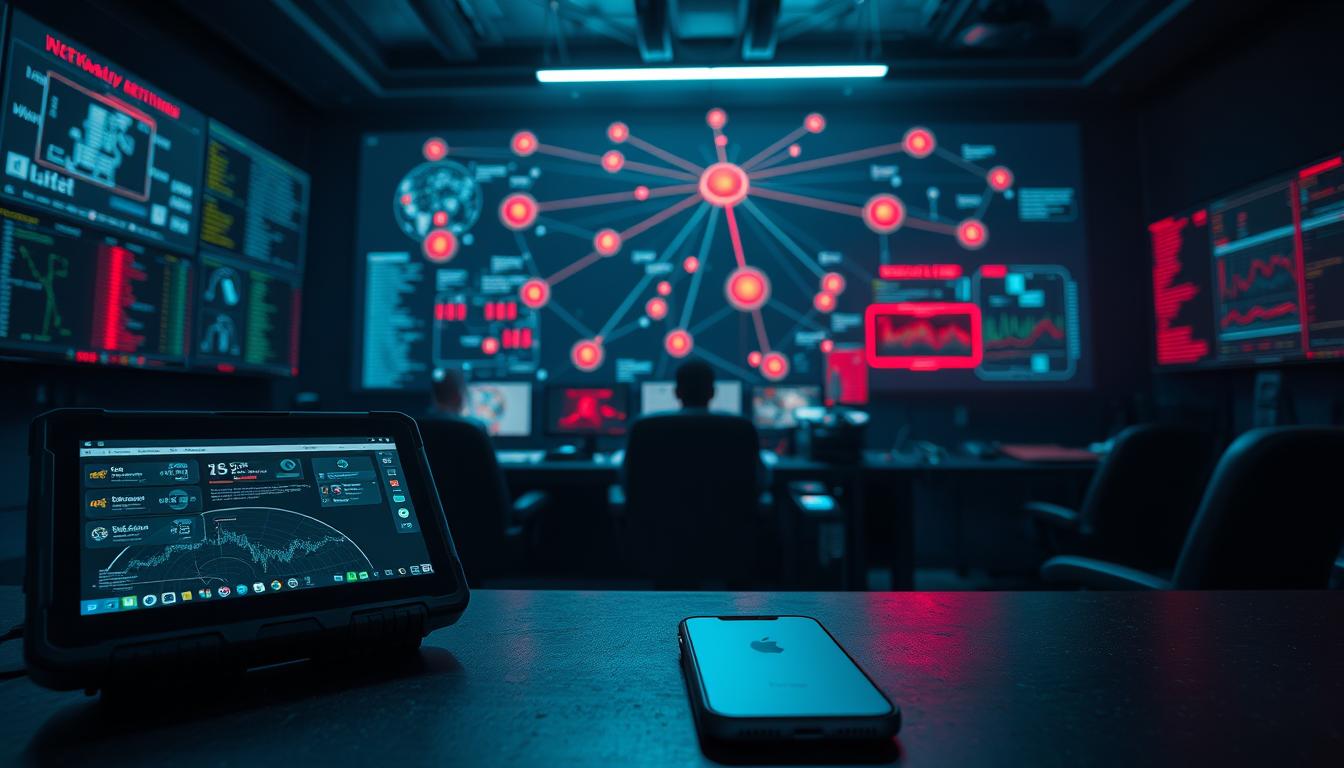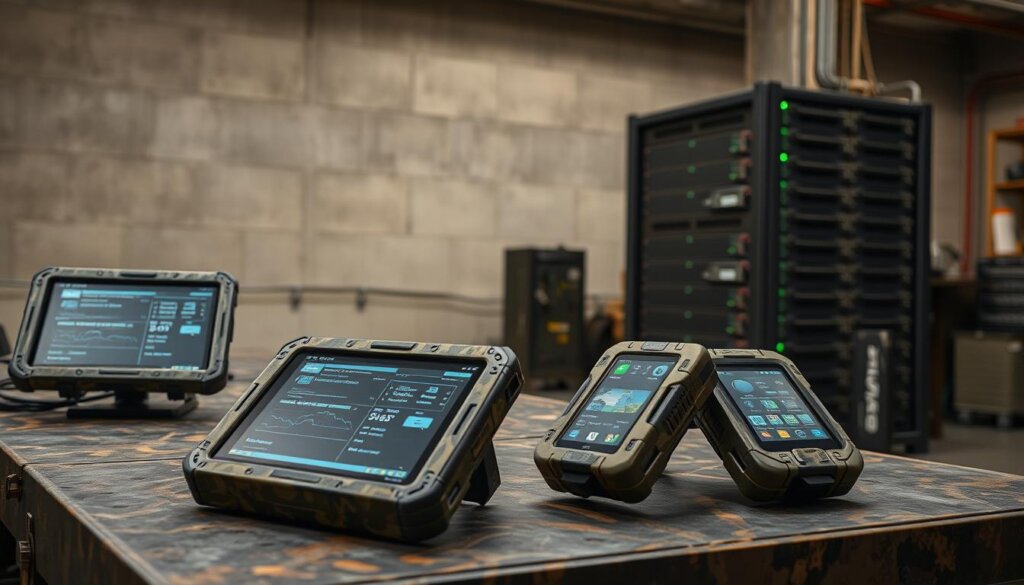Did you know almost 80% of businesses have faced a mobile security issue in the last year? This shows how important it is to protect field service devices. We need to focus on keeping iOS, Android, and rugged devices safe from threats.
These devices are key in our critical infrastructures. With new mobile and rugged tech, keeping data safe is more urgent than ever. Let’s look at how we can protect our devices and keep our operations running smoothly.

Key Takeaways
- Understanding the importance of cybersecurity in mobile field devices.
- The growing threats faced by iOS, Android, and rugged devices.
- Essential best practices for boosting mobile device security.
- Data protection strategies vital for keeping devices safe.
- The role of cybersecurity in boosting operational efficiency.
Introduction to Cybersecurity for Mobile Devices
Mobile device cybersecurity is more important than ever. Mobile tech changes how we talk and work, and we handle sensitive info on the move. This shift brings big benefits but also big risks.
Many mobile apps have security problems. So, I need to stay alert and pick safe apps. This way, I can keep my data safe from harm.
The Importance of Cybersecurity in Field Service Devices
Cybersecurity is vital, and it’s even more critical for field service devices. These devices manage sensitive data and are key to many sectors like healthcare and manufacturing. It’s essential to protect this data as cyber threats keep getting worse.
Not having strong field service security can cause big problems. Data breaches can lead to huge financial losses and harm a company’s reputation. For example, healthcare breaches can lose patient trust and result in big fines.
More companies are facing cyberattacks every year. This shows how urgent it is to improve field service security. Good cybersecurity protects data and keeps operations running smoothly. Investing in field service security is a smart move for any company’s future.
Common Cybersecurity Threats to iOS and Android Devices
Exploring cybersecurity threats on mobile devices, data leakage and mobile malware are major concerns. These issues harm user privacy and business security.
Data Leakage and Malware Risks
Data leakage happens when sensitive info gets into the wrong hands. Many mobile apps have security flaws that lead to these breaches. Mobile malware is also a big threat, aiming to steal personal data or gain future access.
App vulnerabilities, like bad data storage and poor input checks, are common problems. It’s vital for users and companies to spot and fix these issues.
Authentication Vulnerabilities
Authentication risks are serious, as they can weaken mobile device security. Weak passwords and old authentication methods make users vulnerable. Many apps lack strong multi-factor authentication, raising concerns about data safety.
It’s essential to tackle these authentication risks. Doing so helps protect against threats that could exploit app weaknesses and cause big data breaches.

Best Practices for Cybersecurity for Field Service Devices
In today’s digital world, it’s key to follow cybersecurity best practices for field service devices. A good plan mixes strong technology with well-trained people. This starts with teaching employees about cybersecurity risks.
When workers know about threats, they can help protect against cyber attacks. Regular security checks are also important. They help find weak spots and improve how to deal with risks.
By doing these checks, companies can update their security plans. This makes their devices safer. Adopting secure coding practices is another important step. It helps prevent many common problems.
Writing software with security in mind keeps data safe. It also makes users trust field service devices more. By focusing on these steps, businesses can lower their cybersecurity risks a lot.
Implementing Device Protection Strategies
In today’s world, keeping mobile devices safe is key. Cyber threats are always changing. To stay safe, we need strong device protection strategies. This includes data encryption and multi-factor authentication.
These methods help keep our information safe. They also make sure we follow important rules.
Data Encryption Techniques
Data encryption is a strong defense against cyber threats. It keeps information safe when it’s stored or being sent. Using strong encryption helps block unauthorized access.
This way, our data is protected from hackers. It also helps us meet security standards.
Multi-Factor Authentication Benefits
Multi-factor authentication (MFA) adds a vital layer of security. It makes it hard for hackers to get into our devices. MFA asks for more than just a password to log in.
This makes our devices much safer. It helps keep our field service operations secure.
Rugged Checkpoints: The Frontline of Cybersecurity
Rugged devices are key in fighting cyber threats. They are made for tough environments and have top-notch security features. Their strong build and design make them perfect for places that need both work efficiency and safety.
Features of Rugged Devices for Security
Rugged devices are built to last, protecting against damage, dust, and water. This makes them a strong part of network security. They also have strong encryption to keep data safe from hackers.
Other security features include secure boot and hardware protection. These ensure only trusted software runs on the device. For IoT protection, these features are critical to keep systems safe.
Role of Networking and Connectivity in Security
Good networking and connectivity are key for security. Rugged devices support advanced protocols for safe data sharing. This is very important in industrial settings where many devices work together.
Secure networking helps keep devices safe from hackers. In today’s world, protecting IoT devices and keeping connections secure is vital for strong cybersecurity.

Remote Monitoring and Threat Detection
In today’s digital world, remote monitoring solutions are key to keeping field service devices safe. Advanced threat detection systems offer real-time network surveillance. This lets organizations find vulnerabilities early, preventing big problems.
Proactive security makes me feel safer in my work. With ongoing monitoring, I can catch any odd activity fast. This means I can act quickly to avoid harm. Sophisticated tools help in detecting threats and make managing security easier.
Endpoint Security Solutions for Field Devices
In today’s digital world, endpoint security is key to protecting field devices from threats. I’ve found that using unified endpoint management systems greatly improves device security. These systems let you watch and control all devices from one place, keeping them safe in real-time.
Advanced endpoint detection tools also help a lot. They spot and handle security issues before they become big problems. These tools work well with current IT security setups. By using them, I can make sure field devices are well-protected and secure.
Regulatory Compliance and Security Standards
In the world of cybersecurity, following the rules is key for any business. Each industry has its own set of rules, like HIPAA for healthcare, GDPR for data in Europe, and PCI-DSS for payment security. These rules help keep sensitive info safe and make sure companies are secure.
Following these rules makes mobile devices and companies safer. It also shows clients and customers that a company is trustworthy. This trust can help a company grow and stand out in the market. It’s very important for businesses to take strong steps to protect data and meet these standards.
Conclusion
When it comes to cybersecurity for field devices, the stakes are high. We must protect sensitive data and operations. I’ve shown how important it is for companies to use the right cybersecurity strategies.
These strategies help fight off common threats and keep data safe. The right steps can really make a big difference. It’s all about being proactive and using the latest security tools.
Keeping field devices secure is a big job that never ends. It needs constant effort and a forward-thinking approach. Using data encryption and multi-factor authentication can greatly reduce risks.
It’s also key to stay ahead of threats. This is why proactive measures are so important. They help us stay safe in a changing digital world.
But it’s not just about the tech. Teaching employees about cybersecurity is just as important. By focusing on both technical and cultural aspects, companies can better protect their assets.
See how FieldAx can transform your Field Operations.
Try it today! Book Demo
You are one click away from your customized FieldAx Demo!
FAQ
What are the key cybersecurity threats to field service devices?
Field service devices face threats like data leaks and malware. They also have weak authentication. Many mobile apps have security issues, making them easy targets for hackers.
Why is data encryption important for mobile devices?
Data encryption keeps sensitive info safe. It protects data when it’s stored and when it’s being sent. It’s also key for following security rules.
How can organizations train their employees on cybersecurity awareness?
Training employees is key. Use regular sessions, workshops, and update policies on data safety. This helps them spot threats and avoid mistakes.
What role does remote monitoring play in cybersecurity?
Remote monitoring is vital. It keeps an eye on field devices all the time. It uses advanced systems to catch and act on threats fast.
What are endpoint security solutions, and why are they important for field devices?
Endpoint security protects devices from threats. It includes tools for managing and detecting threats. These tools work with IT security to keep devices safe.
How do regulatory compliance and security standards impact cybersecurity measures?
Rules like HIPAA and GDPR push for strong security. Following these rules keeps data safe. It also builds trust in the company.
Author Bio
Co-Founder & CMO at Merfantz Technologies Pvt Ltd | Marketing Manager for FieldAx Field Service Software | Salesforce All-Star Ranger and Community Contributor | Salesforce Content Creation for Knowledge Sharing





